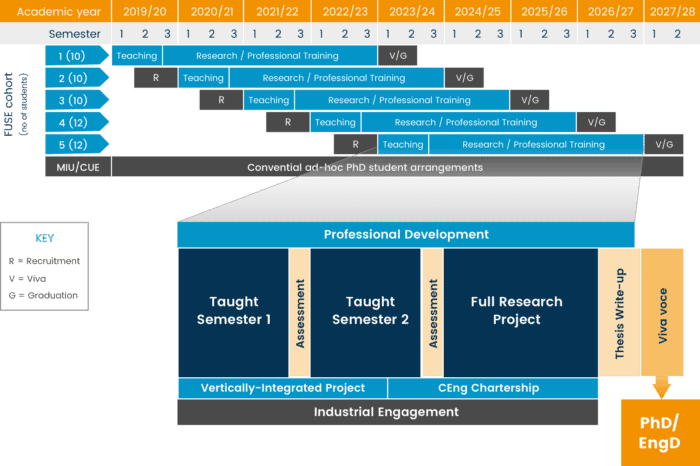Programme
FUSE training is the first such ultrasonic engineering programme in the world.
The research degree for each student usually spans four years. The first 12 months, starting with an Induction Week, contain two taught semesters for full time students including a vertically-integrated project (VIP) with formal assessment, followed by 36 months on the Full Research Project, including the thesis.
A globally unique training programme
We welcome part-time students, supporting them individually as part of our Equality, Diversity and Integration Action Plan. Most importantly, interaction with full-time peers and other research students in MIU and CUE will be maximised to play a full part in FUSE.
Courses and cohort activities in the first year of training are orientated towards fostering relationships with our academics and industrial partners, to allow each student to initiate, confirm and deepen connections in a preferred sub-specialism before the Full Research Project.
As the University of Glasgow and the University of Strathclyde are geographically close (2 miles apart), taught courses are provided on both sites during both semesters, with travel time allowed for the 30-minute journey between the two locations.
All students are formally registered at the University of Glasgow and the University of Strathclyde and each student then concentrated at the lead institution of their principal supervisor during their full research project from Year 2 – 4.

First Year Training
Semester 1 runs from September to December, and Semester 2 runs from January to May. In order to progress, a student must have acquired 120 credits.
Each course and project is worth a number of credits, indicated in brackets below. EngD students need to complete an additional 40 credits of business and management related training in Years 2 – 4.
You can access course descriptions online, by searching via the course code in the University of Glasgow course catalogue or the University of Strathclyde class catalogue.
Semester 1 and 2
Vertically Integrated Project (20)
The VIP approach matches industry’s span of technical coverage and seniority in many projects. Each cohort of 1st year FUSE students divides into 3 groups, each forming part of a vertically integrated team.
The other 10 – 15 team members are drawn from other FUSE cohorts, MIU / CUE PhD students and postdoctoral researchers, with competitive student selection. Each multi-year VIP is co-created by academics, students and external partners, with the 3 projects covering different end-uses.
| Semester | Title | Code | Site | Credits |
|---|---|---|---|---|
| 1 | Ultrasonics Technology and Applications | ENG5319 | Glasgow | 10 |
| 1 | Digital Signal Processing or Image and Video Processing | EE969* or EE981* | Strathclyde | 10 |
| 1+2 | Ultrasonic Engineering Case Study | ENG5328 | Glasgow/Strathclyde | 20 |
| 1+2 | Sensor Technologies | EE987 | Strathclyde | 20 |
| 1+2 | Vertically Integrated Project (VIP) | ENG5320 | Glasgow | 20 |
| 2 | Advanced Ultrasonics | ENG5316 | Glasgow | 10 |
| 2 | Ultrasonic Materials and Applications | ENG5318 | Glasgow | 10 |
| 2 | Research Methods | CS957 | Strathclyde | 10 |
| 2 | Experiments in Ultrasonic Engineering | ENG5317 | Glasgow | 10 |
A FUSE student will gain a PhD (or in some cases an EngD). A PhD involves a single project, or a set of projects following a single pathway. PhD students work in either university, or between them, and may spend periods of several weeks with external partners.
Every doctoral project has at least one external partner, drawn from the total of more than 30 already committed to FUSE and from others who will join the community.
Each external partner contributes to the creation of the research topic and provides on-going mentoring and supervision.
As well as submitting to the annual progress review mechanisms of each university, according to where they are registered, each student gives and presentation or a poster at the FUSE annual research meeting. These are organised by the students themselves.
FUSE CDT received MPDS accreditation from iMechE in April 2020 to support our students to gain Chartered Engineer status. As a Chartered Engineer you benefit from an internationally recognised qualification that improves your long-term earning potential and validates your training to become a professional and competent engineer.
FUSE CDT provides each student with a Researcher Personal Development Plan that is fully endorsed by iMechE in order to meet the key competencies for Engineering Chartership. Whether you need to learn about protocols in Research Data Management, Integrity & Ethics, Project Management & Leadership or Entrepreneurship in an Innovative Environment, we will support you in actively seeking opportunities to learn and develop key skills for academia and industry.
Alongside technical training, FUSE students benefit from a professional skills programme including key topics such as data management, time management, and communications in their first year and topics aimed at enhancing impact.
Professional skills training forms part of the formal training in the first year and via continuous professional development for the duration of the studentship. The courses include input from external partners to match the skills demanded of future technology leaders. Students are supported to own their development, including through practical work in public engagement / impact.